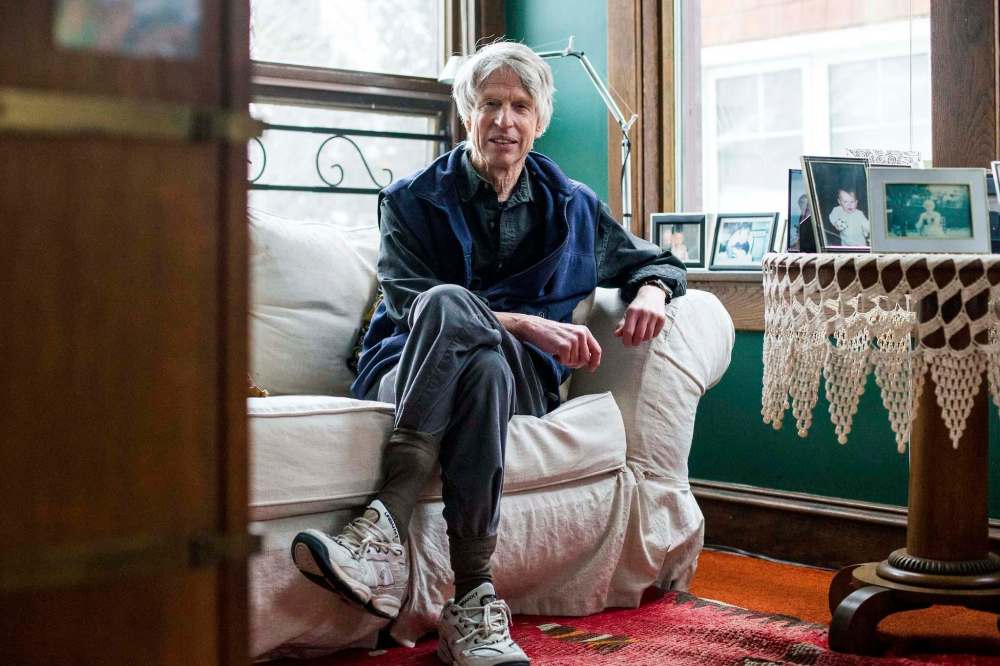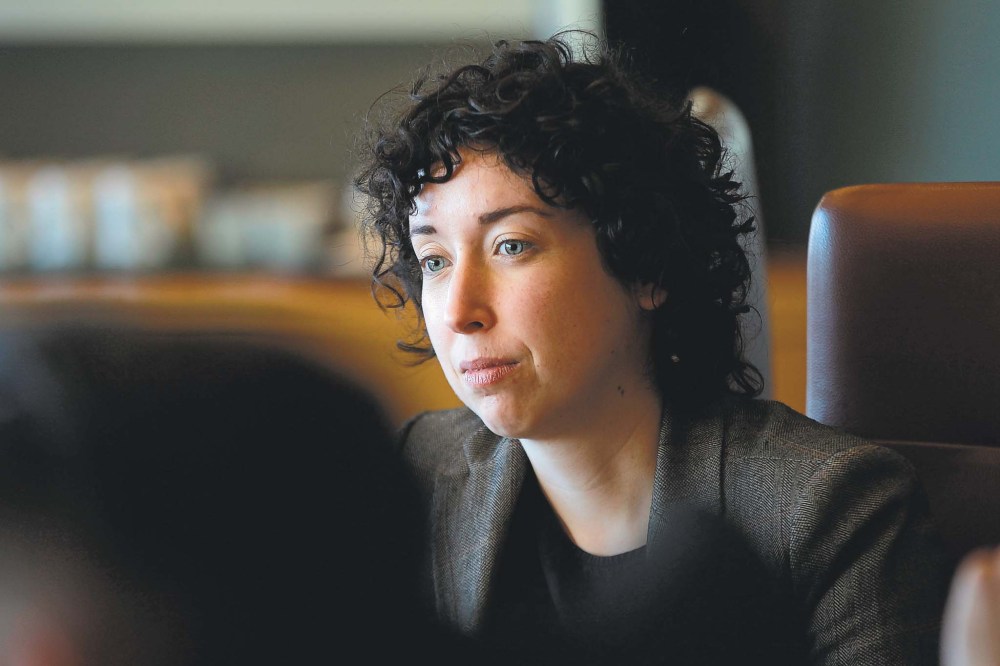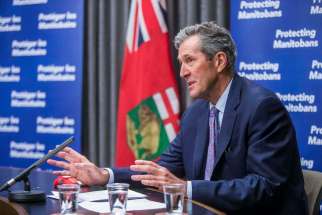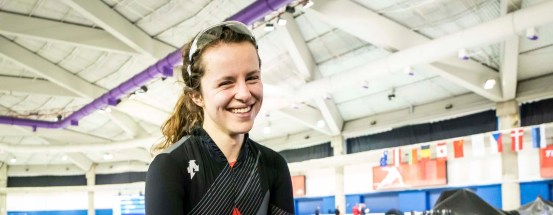Prickly topic Examining the realities, legalities and moralities surrounding COVID-19 vaccine
Read this article for free:
or
Already have an account? Log in here »
To continue reading, please subscribe:
Monthly Digital Subscription
$0 for the first 4 weeks*
- Enjoy unlimited reading on winnipegfreepress.com
- Read the E-Edition, our digital replica newspaper
- Access News Break, our award-winning app
- Play interactive puzzles
*No charge for 4 weeks then price increases to the regular rate of $19.00 plus GST every four weeks. Offer available to new and qualified returning subscribers only. Cancel any time.
Monthly Digital Subscription
$4.75/week*
- Enjoy unlimited reading on winnipegfreepress.com
- Read the E-Edition, our digital replica newspaper
- Access News Break, our award-winning app
- Play interactive puzzles
*Billed as $19 plus GST every four weeks. Cancel any time.
To continue reading, please subscribe:
Add Free Press access to your Brandon Sun subscription for only an additional
$1 for the first 4 weeks*
*Your next subscription payment will increase by $1.00 and you will be charged $16.99 plus GST for four weeks. After four weeks, your payment will increase to $23.99 plus GST every four weeks.
Read unlimited articles for free today:
or
Already have an account? Log in here »
Hey there, time traveller!
This article was published 18/12/2020 (1821 days ago), so information in it may no longer be current.
By this time next year, when many Canadians will have been vaccinated against COVID-19, it’s possible people will only be allowed to take certain jobs, fly to the tropics or even attend a concert if they have had the jab.
The Pallister government has ruled out the idea of mandatory vaccinations, but it’s unclear whether Manitobans will have their freedom clipped depending on whether they’ve been immunized.
A “vaccine passport” or “immunity card” presents legal, ethical and political dilemmas. Governments and private business each hopes the other will set the standard for society.
A staggered rollout of the vaccine could create two classes of people, as witnessed by the hierarchy that took root in the U.S. South for decades during yellow fever outbreaks.

Meanwhile, labour rulings over requiring flu shots and COVID-19 tests reveal the factors that courts and tribunals will have to weigh if vaccines become a requirement of employment.
Arthur Schafer, a University of Manitoba bioethicist, worries there might be a wide gap between those with COVID-19 immunity and everyone else who can’t get a vaccine.
“We’re talking about moving to a caste system in society, a system of the immuno-privileged — those who have antibodies — and the immuno-deprived,” he said.
“The consequences of that would be very severe.”
A shot in the dark
Any discussion about requiring employees to get a vaccine is predicated on an unknown factor: whether vaccines prevent someone from spreading the novel coronavirus.
Research has deemed both the Pfizer and Moderna vaccines extremely effective in preventing illness in people about a week after they get the second injection of a two-shot vaccine.
But researchers are only starting to determine if either vaccine cuts down on the risk of transmitting the virus, and by what degree.
“The ethical justification for mandatory vaccination would be greater if we had evidence the vaccine prevents transmission of the virus,” wrote Maxwell Smith, a bioethicist at Ontario’s Western University, who is part of a World Health Organization ethics working group on COVID-19.
Immunologists note that while the vaccines prevent COVID-19 from wreaking havoc on a person’s vital systems, it’s unknown if coronavirus particles can linger in airways and be breathed out, thus infecting another person who hasn’t been vaccinated.
“Beyond the individual’s choice and decision-making about their own body, there is also the consideration (for employers) of others in the workplace– employees and members of the public — and their needs to be safe and healthy.” – Dayna Steinfeld, Winnipeg labour lawyer
The vaccines are so new that it’s unclear whether these inoculations last beyond six months.
Similarly, we still don’t know how long people who have naturally recovered from COVID-19 are prevented from getting infected again. Some epidemiologists suggest that time frame could vary based on the severity of the first infection.
Evidence is emerging about whether children and pregnant women can safely take either vaccine. The same uncertainty surrounds people who are immuno-compromised, a population among the most likely to die from a COVID-19 infection.
Those unknown factors will influence whether anyone gets any form of preferential treatment for being immune, Schafer cautions.
“We possess islands of knowledge in a sea of ignorance,” said Schafer, the founding director of U of M’s Centre for Professional and Applied Ethics.
‘No one-size-fits-all’
Health-care workers across Canada have been compelled to wear masks since the early stage of the pandemic. Manitoba nurses have demanded more protective equipment, as have their colleagues across Canada.
But it hasn’t always been that way. Several labour rulings in Ontario, which had competing outcomes, show what grounds employers need to require workers to get vaccines, be tested or wear masks.
“It’s always going to depend on who the employer is, the nature of the workplace, and what the employee is doing,” said Winnipeg labour lawyer Dayna Steinfeld.
For example, an IT worker at a long-term care home who doesn’t interact with residents would likely have a different requirement than frontline nurses.
On Dec. 8, a labour tribunal ruled that a Woodstock, Ont., personal care home was justified in requiring its asymptomatic staff to have a COVID-19 test every two weeks.
The arbitrator found that while a nasal swab is invasive, it helped bring down the risk of death, and the employer paid for the tests and found alternatives, including throat swabs, for staff who kept getting nosebleeds.

In July, the same tribunal ruled a security firm had grounds to dismiss an employee who showed up to work on the same day as taking a COVID-19 test, instead of waiting for the result, which ultimately was positive.
“Beyond the individual’s choice and decision-making about their own body, there is also the consideration (for employers) of others in the workplace — employees and members of the public — and their needs to be safe and healthy,” said Steinfeld, a lawyer with the firm Fillmore Riley who represents firms in disputes with unionized staff.
Tribunals demand that those various considerations be based on evidence.
In 2018, the same tribunal rejected a Toronto hospital’s policy that required health-care workers to either get the annual flu shot or wear a surgical mask in patient areas since 2014.
The tribunal found hospitals couldn’t compel nurses to wear face masks for months, as there wasn’t sufficient evidence at the time to prove that face masks prevented asymptomatic nurses from the spreading flu to patients.
Similarly, the tribunal noted that flu shots don’t always match the variety of influenza that appear each winter.
Yet the arbitrator noted all of this could be overturned if a more effective vaccine came about, or if research proved masks limit flu transmission.
“If a better vaccine and more robust literature about influenza-specific patient outcomes were available, the entire matter might be appropriately revisited,” reads the ruling.
Wassim Garzouzi, a labour lawyer who tends to represent unions, said that could foreshadow the different considerations relating to a coronavirus vaccine.
“Ultimately, any assessment will be based on the available science,” said Garzouzi, a lawyer with Raven Law in Ottawa.
“Any path forward will need to provide accommodation and exceptions. There will be no one-size-fits-all solution.”
Schafer said many of these disputes hinge on the ethical concept of utilitarianism: trying to do the most social good while causing the least harm.
That’s embodied in a 1986 Supreme Court ruling known as the Oakes case, which concludes that someone’s rights can only be restricted based on a “pressing and substantial” goal that can be “demonstrably justified in a free and democratic society.”
“Any path forward will need to provide accommodation and exceptions. There will be no one-size-fits-all solution.” – Wassim Garzouzi, labour lawyer
In 2017, the Supreme Court told arbitrators how to weigh those factors to see if policies strike the right balance.
“Assessing the reasonableness of an employer’s policy can include assessing such things as the nature of the employer’s interests, any less intrusive means available to address the employer’s concerns, and the policy’s impact on employees,” reads the case.
How those factors look in practice can be complicated.
The practical reality
Garzouzi and Steinfeld wonder how businesses that want employees or customers to prove they’ve been vaccinated will act.
Ticketmaster got immediate blowback last month when reports suggested the vendor planned to require proof of vaccination to purchase tickets. The U.S. company insists it’s only exploring that option, which did little to quell the uproar.
Employers across Canada have legal obligations to ensure and promote safe workplaces, which Steinfeld said could include a duty to protect employees from exposure to COVID-19.
She believes that motivated many Winnipeg businesses to close up shop in March, before public-health orders mandated restrictions.
“I wouldn’t be surprised if we see that start to be tested in the private sphere, before we see anything from the government,” Steinfeld said about requiring vaccination, though she cautioned it would hinge on whether shots are widely available.
Yet Garzouzi expects the opposite, with businesses seeking clarity from governments that could shoulder the blame for rules people dislike or oppose.
“All employers, including hospitals and other health-care organizations, are hoping governments and public-health authorities mandate vaccines for specific jobs,” he said.
“This defers responsibility and accountability to government, rather than specific employers who do not want to be the ones making judgment calls.”
But even accommodations, such as restricting non-vaccinated employees from certain areas, can have dramatic consequences, said Kerry Bowman, a University of Toronto bioethicist.
He recalled working in a hospital where those who didn’t have a flu shot had to wear a bright sticker on their staff work pass that they wore on a lanyard.
“It was a bit of scarlet letter. Everybody could see when a person had refused a vaccination; it was obvious to everyone and there was a lot of social pressure with it,” Bowman said.
Steinfeld said she expects the rules to be settled through labour negotiations, and cases where non-union employees contest firings.
“There are legal considerations which are not always clear, because the law is responsive and it hasn’t responded yet to the new circumstances of the pandemic,” said Steinfeld.
Existing laws would likely make it difficult for employers to outright impose a vaccine requirement, but that might change, she said.
“As the law responds to the pandemic, there might be more room for these kinds of requirements,” Steinfeld said, especially if there are exemptions for religious convictions or those allergic to vaccines.
“We don’t know what the law is going to look like in a post-pandemic world.
A new caste system?
In the 19th century, recurring outbreaks of yellow fever used to kill nearly half of the people in New Orleans who had contracted that virus.
Those who survived moved to the front of the line for jobs, life insurance and even marriage in certain families.
Slave-traders even charged more for Black people who had immunity to yellow fever.
“Presumed immunity concentrated political and economic power in the hands of the wealthy elite, and was weaponized to justify white supremacy,” Schafer said.
He worries that requiring a COVID-19 vaccine or proof of natural immunity would likely deepen the inequities exacerbated by the pandemic.
“The immuno-privileged have liberty of movement and employment, and socialization. And the immuno-deprived remain isolated in lockdown,” he predicted, foreseeing “a very large number of people who become the new underclass.”
Schafer said that would likely breed contempt and entice people to ignore public-health orders.
All employers, including hospitals and other health-care organizations, are hoping governments and public-health authorities mandate vaccines for specific jobs.” – Wassim Garzouzi, labour lawyer
“The consequence for social solidarity could be enormous,” he said. “There’s really been a strong sense from the outset (of the pandemic) that we’re all in this together.”
Records suggest that during New Orleans’ decades of yellow fever, Irish immigrants seeking work would sometimes try to get infected, in order to secure the privileges of immunity.
Schafer fears that if vaccines aren’t widely available, and businesses start offering preferential access to those who have been immunized, people would similarly seek out COVID-19.
He finds a so-called COVID Zero approach to be less ethically dubious. Under such a model, used by the Australian state of Victoria, a strict lockdown that lasted weeks was imposed until case counts were low enough that contact tracing and isolating kept the spread under control.
Yet Schafer said that would have required Manitoba to hire enough contact tracers and set up more testing ahead of this fall’s second wave.
“Everyone knew it was coming, and our provincial government, with its dedication to austerity and balancing the budget… just failed miserably,” Schafer contends.
Regardless, Garzouzi says mandating a COVID-19 vaccine has become a hot topic in the past month throughout the health-care sector.
“These discussions are happening right now. It is top of mind for employers, unions and workers,” he said. “The uncertainty is being felt across all industries — but the pressure is especially high on health-care workers, who are first in line.”
Getting ahead of ourselves
Governments are much less keen to start thinking about those choices.
Yet Manitoba’s top doctor suggested Thursday there is no hurry to consider whether to grant extra privileges to those with COVID-19 immunity, because vaccine demand will outstrip supply for months.
“Right now, there’s a huge amount of demand for very minimal supply, so that’s what we’ve got to focus on,” said Dr. Brent Roussin, chief provincial public health officer.
“(I’m) really expecting the vast majority of Manitobans to avail themselves to this vaccine, and then we can get that population-level benefit. If we need strategies to help with that, then we’ll definitely consider it.”
Roussin suggested compelling health-care workers to take a vaccine is not how things have been done in Manitoba.
“If we run into any troubles, then we have to look at different ways to address it. But I really think we’re going to have high demand from our health-care workers for this vaccine,” he said.
Bowman said leaders shouldn’t wait to start thinking about how we want vaccines to shape our society.
“When things are complex — socially, politically, ethically — it’s much better to get people thinking about it in advance.”
Public trust
These ethical questions could hinge on whether Manitobans feel comfortable getting a vaccine.
Statistics Canada surveys released this week show 69 per cent of Manitobans felt they would likely get vaccinated, compared with 76 per cent of Canadians overall.
Many researchers believe more people will feel comfortable with vaccines as it gradually rolls out, if they see nurses and older people staying healthy months after getting both COVID-19 doses.
Schafer, for example, does not anticipate vaccine hesitancy will be pervasive enough to prevent Manitoba from achieving herd immunity, which will be required to safely get those with vaccine allergies and compromised immune systems back into society.
He believes the province could make moves to lessen the risk of vaccine hesitancy that might delay Manitoba from achieving herd immunity.
“Manitoba’s public health officials and the government have not been particularly open, transparent or honest in their messaging, and I don’t think that’s been good,” said Schafer, arguing the province is often unclear about its data, knowledge gaps and legal requirements.
“Public trust is the most important resource we have as a society, and that public trust is not generated by fancy, slick PR, but by trustworthiness.”
Bowman said that includes clearing up confusion about which allergies can lead to adverse reactions.
In any case, he says people who object t vaccines on personal or religious grounds will likely have to suck it up until herd immunity is accomplished.
“They have a right not to be vaccinated, but I don’t think you can have a society that cannot move forward because of their rights,” he said. “I think they’ll probably have to live with the limitations of whatever is coming.”
— With files from Danielle Da Silva
dylan.robertson@freepress.mb.ca
History
Updated on Saturday, December 19, 2020 9:33 AM CST: formatting pull quote









